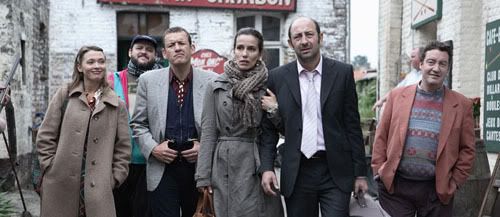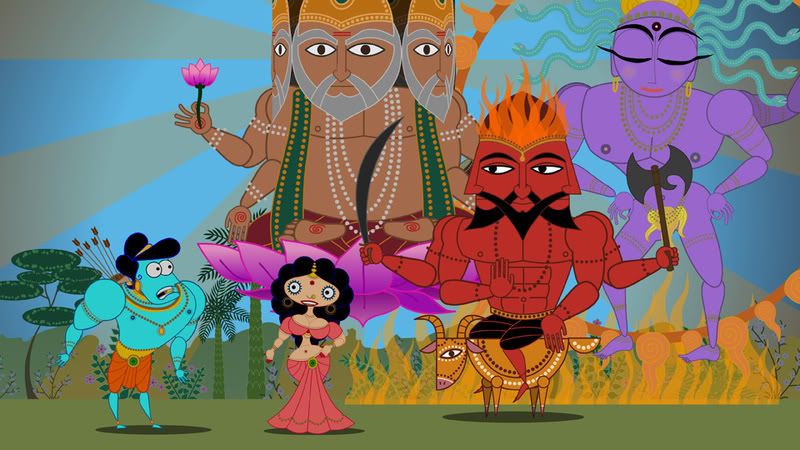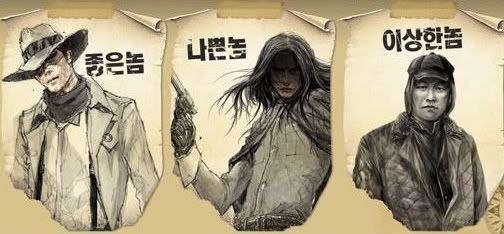Ok, so after schlepping to Apple and paying through the nose for a new battery, I am all shades of broke -- purple, magenta, a sick, barfy yellow. (And, I still have to get the stupid top case replaced.) So, no ridiculously scalped concert tickets for me, no new camera glass, and no new anything for the next 6 months or so. Just food and drink and transit. O, DarthBook. With you, I fear I have always arranged my affections into too fragile and delusional a bouquet. And, you've been an absolute cow.
Anyway, so I watched my last VIFF movie a few days ago. Just for funsies, I've decided to rate them according to how much I enjoyed them. This essay into hierarchy-development is slightly misleading: they were all quality films, I totally lucked out when I glanced through the catalog (my movie selection process was embarrassingly arbitrary). The worst one I watched will always be a better use of my time than, say, watching a Hills marathon. And, I fucking love The Hills. I love it like I'd love an eleventh finger -- it's entirely beyond the normal scope of what I require of my body and appendages, and it's not a little ghastly, but I'd love it just as much as I would my ten others.
To the list! (That's a lot of American movies, I just noticed. Um, click picture for source.)
Welcome to the Sticks [France]. This one was such a gas. We watched it on a rainy Monday afternoon, so a pleasantly empty theatre was to be expected. But, no, as with most other widely released, critically acclaimed French movies, the middle-aged, summer-in-Bordeaux/Provence/Southern France set came out in droves to watch it. (And, even worse, I got seated next to the worst old-person stereotype: the one who thinks they're too old to wear deodorant. I guess that lends itself to the whole authenticity of the experience. You know, if I could just use one more stereotype/misconception: the French don't wear deodorant! Zut alors!) The film was great fun, really. One middle-manager, driven to defeatism by an aggressive, volatile wife, gets transferred to a town in northern France. (After a hilarious attempt to secure a post in the Riviera.) Despite his gross misconceptions of the Ch'ti (who claim Ch'ti-vie Wonder as one of their own), he falls for its charms, its characters, its fried foods, and its alcohol. He continues to lie to his wife about it, who, touched by the profound "sacrifice" of her husband, becomes a paragon of good wifely virtue. Antics, expectedly, ensue. It's a sweet little movie, filled with good, stunningly simple humour, and fluid characterization.
Sita Sings the Blues [U.S.A.]. This one was absolutely mesmerizing. I remember taking up The Rāmāyaṇa in high school -- which means, we read an excerpt after establishing minimal context -- but, the misogyny of it just completely went over my head. (Although that's probably because we only read the part about how Rama rescued Sita from the dude with the many heads. Literary complexity and cultural nuances weren't really big deals in my school, ok.) The animation was stunning and eloquent, and I loved the way the whole story was put in the context of a sort of collective consciousness. Like, the story's sublime thread was wound around the bones of Indians while they were in their mothers' wombs, or something. The musical numbers, which I understand are integral to the theme, got a little tiresome though. But, they still worked. And the way the filmmaker posited her own personal journey as a parallel to the themes of redemption and empowerment of the Rāmāyaṇa was done beautifully. That stuff usually fails miserably.
Throw Down Your Heart [U.S.A.]. This was one was just... sublime. Musician and insane banjo player Béla Fleck goes to Africa (Uganda, Tanzania, Gambia, and Mali) to bring the banjo back to its roots. What follows are some of the best spontaneous jamming sessions ever. The nature of the basic insights of the movie was kind of predictable: music is universal, music is the one language that can transcend cultural differences, Africa is not all that bad, etc. And, at some points, the documentary even trotted out a few disingenuous African stereotypes. The music though... the music was awesome. I could have sat there for hours just listening. Some of the best cuts: Oumou Sangare, Jarju and the Jatta family, Harouna Samake and his wife Ami, and maybe a few others. The insights were predictable, yeah, but that doesn't take away from the charm of the film at all.
Religulous [U.S.A]. Yeah, I have to admit that Maher was pretty much preaching to the choir with me (or, really: one who wants nothing to do with the choir). In retrospect though, Religulous is sort of like those U.S. presidential debates. You go into them knowing who and what you like, and you leave with your preferences and convictions intact (if not reinforced). Maher is a little less absolutist than the major players of the much-touted "new" atheist/secular humanist movement, and I really did appreciate the way he kept going back to the importance of doubt. Honestly though, sometimes his arguments were kind of embarrassing (e.g. the Horus comparison and a few others). But, you know, not on the level of Dawkins' flying spaghetti monster.
Momma's Man [U.S.A.]. A man goes back to his parents' home to visit his sick mother and never leaves. It could have been every North American parent's nightmare (Filipino parents, on the other hand, would love that shit), but it was done so truthfully and earnestly that it becomes an experience quite beyond stereotype and cultural convention. Who wouldn't want to crawl back into their childhood? (Ok, there's a tragic non-joke in there, but, really, I try to limit the mention of pedophilia and child abuse here because they're so depressing.) Going back to that golden space of easy contentment where happiness can be as simple as a prepared meal, your parents' soft and lilting other-room murmurs, and maybe a few novelty toys. It is reprehensible, yes. Just like watching TV all day is reprehensible. But, sometimes, it's necessary, you know?
The Witch of the West is Dead [Japan]. Some parts of this reminded me of a live-action Hayao Miyazaki. Pubescent awkwardness and that needling sense of otherness, the need for sanctuary, the mercurial magic of nature and grandmothers. The ending was a total wash for me though. I wish they hadn't included (was it in the book?) the grandma's disembodied voice echoing ominously in the cottage. They should've just left it with the girl staring out expectantly, with the shifting, whistling wind as the only response to her declaration. That sort of ruined the whole thing for me. And that whole witch-angle I felt should have been more metaphorical and implicit. It just seemed sort of out-of-place with the whole thrust of the film. There were so many touching, poignant scenes in this one that it was almost nauseating. (The one where the grandmother recounts how she discovered the meadow of wild strawberries after her husband's passing? I definitely felt a quiver in my little, black heart.)
The Good, the Bad, the Weird [S. Korea]. This film wasn't at all that bad. It's a western action-adventure film for one thing, and for me at least that translates into no extra points. It was flashy (brilliant shots and sweeps, great sets and costumes, eye-candy cast, etc.), but the plot was kind of lame. Some characters were definitely underused and could've used a lot more development. Ok, most. Ok, all of them. Some parts of it were genuinely exciting and intriguing, but on a whole, unable to prop up the flimsy, feeble plot and premise. And, the ending? You can see it from miles away, and even though you know it's coming and you have time to brace yourself, you still end up feeling embarrassed for everyone involved. Parts > sum.








No comments:
Post a Comment